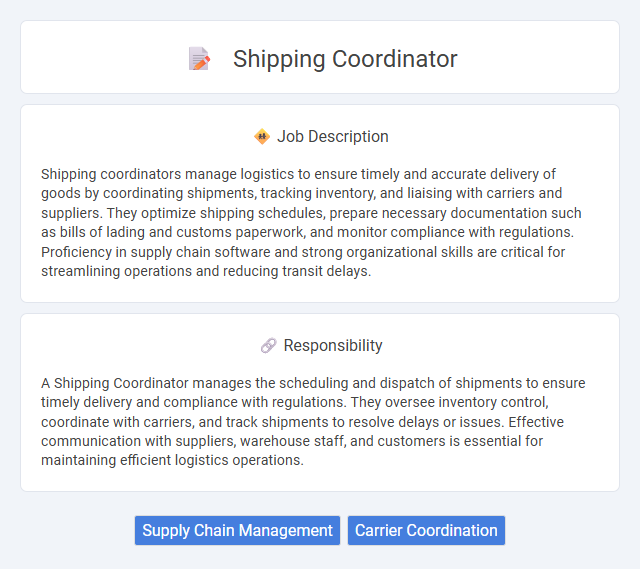
Shipping coordinators manage logistics to ensure timely and accurate delivery of goods by coordinating shipments, tracking inventory, and liaising with carriers and suppliers. They optimize shipping schedules, prepare necessary documentation such as bills of lading and customs paperwork, and monitor compliance with regulations. Proficiency in supply chain software and strong organizational skills are critical for streamlining operations and reducing transit delays.
Individuals with strong organizational skills and attention to detail are likely suitable for a Shipping Coordinator role, as the position demands precise management of shipments and schedules. Those who thrive in fast-paced, dynamic environments and possess good communication abilities may have a higher probability of success. Conversely, candidates who struggle with multitasking or stress management might find this job less suitable.
Qualification
A Shipping Coordinator requires strong organizational skills and expertise in logistics management to efficiently oversee shipment schedules and documentation. Proficiency in inventory control software, excellent communication abilities, and knowledge of shipping regulations are essential for ensuring timely and compliant deliveries. Experience in coordinating with carriers, managing supply chain workflows, and resolving transit issues enhances operational efficiency and customer satisfaction.
Responsibility
A Shipping Coordinator manages the scheduling and dispatch of shipments to ensure timely delivery and compliance with regulations. They oversee inventory control, coordinate with carriers, and track shipments to resolve delays or issues. Effective communication with suppliers, warehouse staff, and customers is essential for maintaining efficient logistics operations.
Benefit
A Shipping Coordinator role likely offers a variety of benefits, including opportunities for skill development in logistics and supply chain management. There is a chance for competitive compensation packages, which may include health insurance, paid time off, and retirement plans. Employees might also benefit from a dynamic work environment that promotes teamwork and problem-solving.
Challenge
Shipping coordinators likely face complex challenges managing logistics, ensuring timely delivery, and coordinating between multiple stakeholders. They might encounter unpredictable factors such as weather delays, customs issues, or supply chain disruptions that require quick problem-solving. Efficient communication and adaptability are probably crucial skills to overcome these obstacles and maintain smooth shipping operations.
Career Advancement
A Shipping Coordinator manages logistics to ensure timely delivery, optimizing supply chain processes and inventory management. Mastering shipping software, compliance regulations, and cross-departmental communication can lead to roles like Logistics Manager or Supply Chain Analyst. Advancing in this career often requires developing strategic planning skills and gaining experience in transportation management systems.
Key Terms
Supply Chain Management
Shipping coordinators play a critical role in supply chain management by overseeing the efficient movement of goods from suppliers to customers. They coordinate transportation schedules, manage inventory levels, and ensure compliance with shipping regulations to optimize distribution processes. Effective shipping coordination reduces transit times, lowers costs, and enhances overall supply chain performance.
Carrier Coordination
A Shipping Coordinator ensures efficient carrier coordination by managing communication between suppliers, carriers, and customers to schedule timely shipments. They track shipments, resolve delivery issues, and optimize carrier routes to reduce costs and improve transit times. Expertise in logistics software and knowledge of freight regulations enhance carrier performance and supply chain reliability.
 kuljobs.com
kuljobs.com